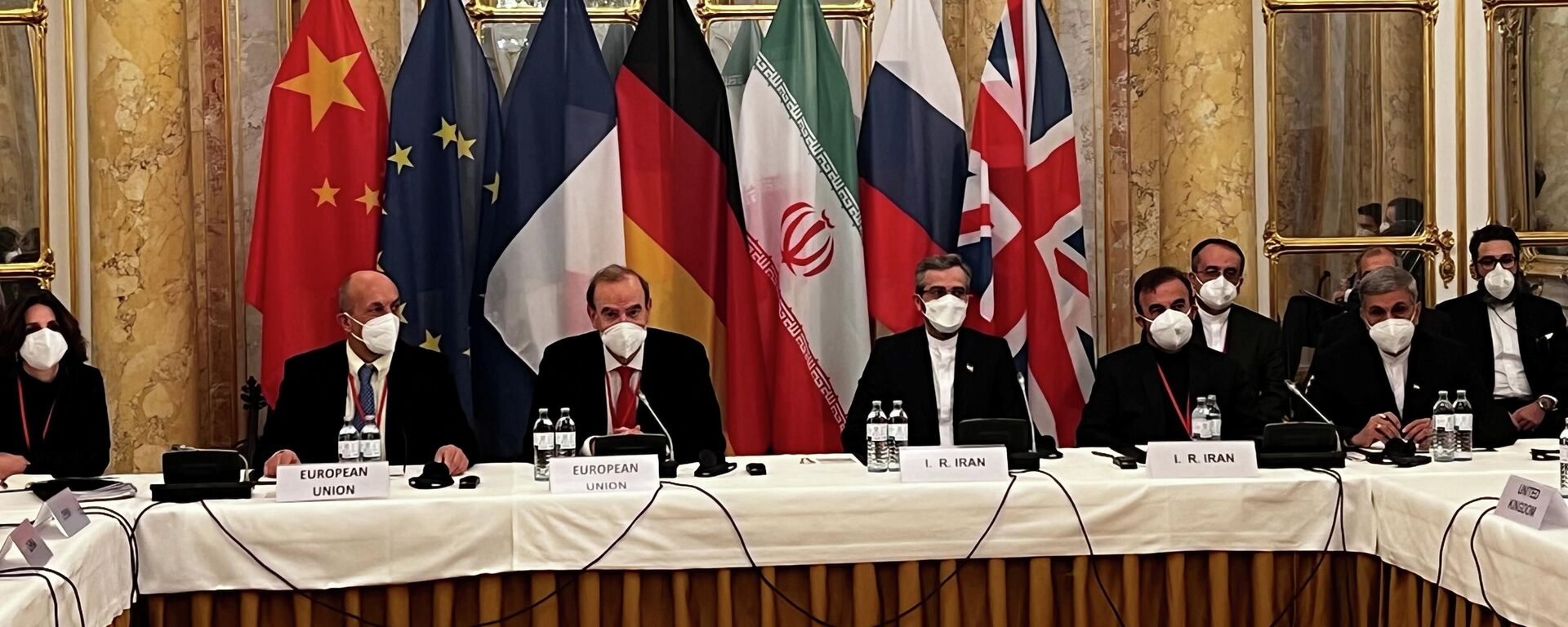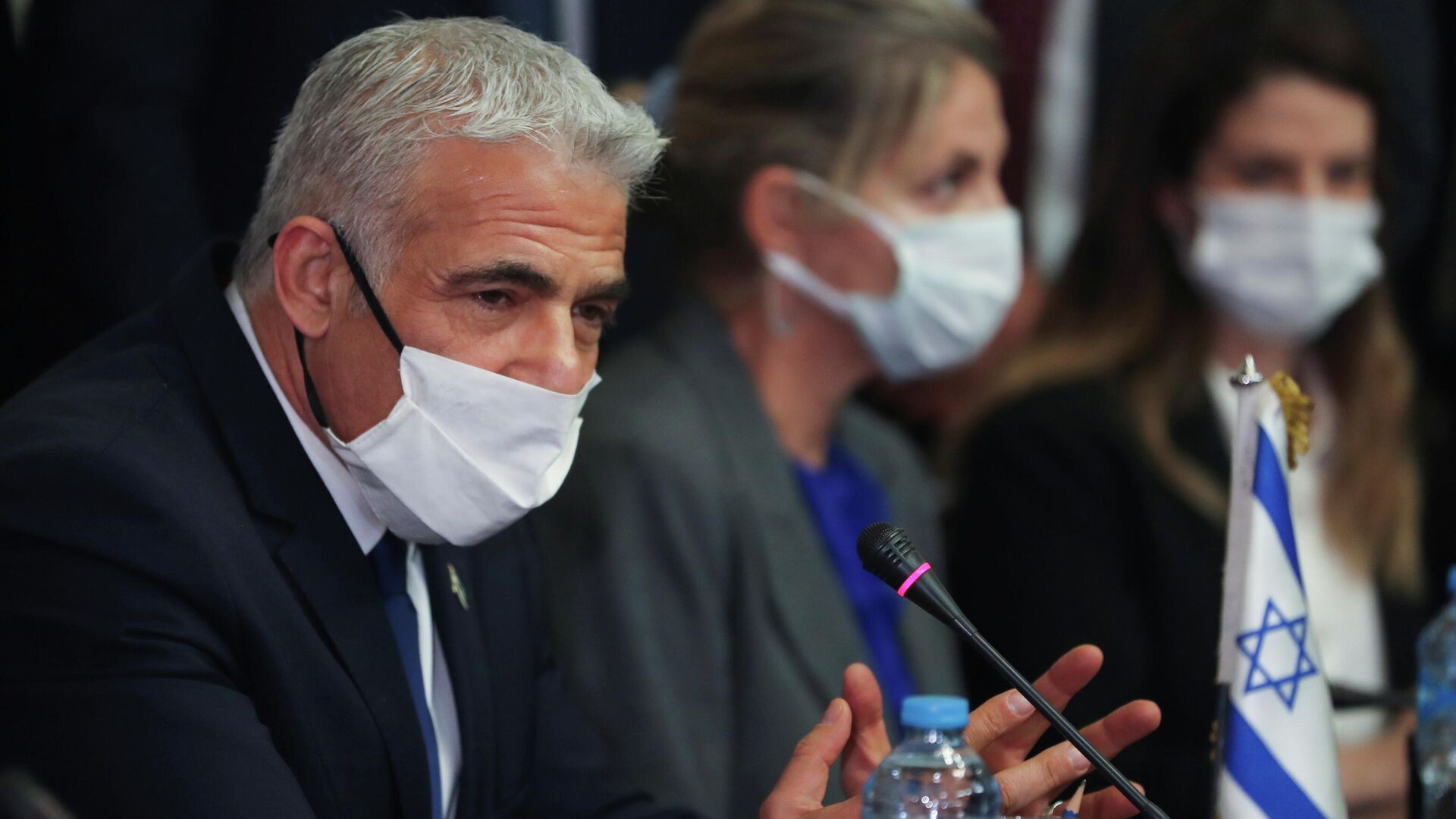https://sputnikglobe.com/20220101/israeli-fm-vows-to-counter-iranian-threat-says-israel-has-capabilities-some-cannot-even-imagine-1091954027.html
Israeli FM Vows to Counter 'Iranian Threat,' Says Israel Has Capabilities Some 'Cannot Even Imagine'
Israeli FM Vows to Counter 'Iranian Threat,' Says Israel Has Capabilities Some 'Cannot Even Imagine'
Sputnik International
Earlier this week, the Iranian Foreign Ministry accused the Israeli government of attempting to sabotage renewed talks on the Joint Comprehensive Plan of... 01.01.2022, Sputnik International
2022-01-01T03:06+0000
2022-01-01T03:06+0000
2023-07-31T16:59+0000
middle east
iran
uranium
nuclear talks
joint comprehensive plan of action (jcpoa)
us
israel
iran nuclear deal
https://cdn1.img.sputnikglobe.com/img/07e6/01/01/1091953847_0:0:3115:1753_1920x0_80_0_0_69fcc280b4d1a36b4ce902d97490a80f.jpg
In a Friday Channel 12 broadcast, Israeli Foreign Minister Yair Lapid bragged that the Israeli Defense Forces (IDF) is prepared to bring to bear an array of "capabilities" to protect itself against what it claimed was an Iranian threat. When asked about Tel Aviv's ability to strike Iranian uranium enrichment facilities and what were described as weapon sites, Lapid declared that Tel Aviv was both capable and prepared to carry out such a strike.Lapid also said that an Israeli attack against Tehran could occur without prior correspondence with the US.He also reiterated that allies have been shown information he claimed "proves the Iranians are lying" in regard to recent nuclear activities. Despite vocal pushback from the Israeli government, which opposed the original 2015 JCPOA pact, Tel Aviv would support a "good deal," as "it is only against the wrong deal." Lapid has previously stated that he would rather the US and other JCPOA signatories walk away from renewed talks than reach an agreement that lacks what he characterized as "real oversight" of Iran's nuclear program. In May 2018, then-US President Donald Trump unilaterally pulled the US out of the JCPOA agreement - also known as the Iran nuclear deal - and reimposed sanctions that crippled the Iranian economy. Tehran soon after abandoned its commitments under the agreement. Following the election of US President Joe Biden, negotiations to revisit the agreement kicked off in April but stalled in June, when Iranian President Ebrahim Raisi took office. More recently, talks saw a pause from the US after American officials concluded that Iran was "not serious" about the ongoing talks in Vienna.Despite delays, Monday kicked off an eighth round of JCPOA discussion. The US communicated earlier this week that progress had been made in defining what it claimed were the main issues preventing Tehran from returning to the pact.According to Iranian Deputy Foreign Minister Ali Bagheri Kani, nearly all delegates have agreed on the need to lift sanctions against Tehran, and expressed plans to consider conditions for their removal.
https://sputnikglobe.com/20211230/head-of-iranian-delegation-says-progress-made-in-jcpoa-talks-in-vienna-1091923420.html
iran
israel
Sputnik International
feedback@sputniknews.com
+74956456601
MIA „Rosiya Segodnya“
2022
News
en_EN
Sputnik International
feedback@sputniknews.com
+74956456601
MIA „Rosiya Segodnya“
Sputnik International
feedback@sputniknews.com
+74956456601
MIA „Rosiya Segodnya“
israel, iran, nuclear talks
israel, iran, nuclear talks
Israeli FM Vows to Counter 'Iranian Threat,' Says Israel Has Capabilities Some 'Cannot Even Imagine'
03:06 GMT 01.01.2022 (Updated: 16:59 GMT 31.07.2023) Earlier this week, the Iranian Foreign Ministry accused the Israeli government of attempting to sabotage renewed talks on the Joint Comprehensive Plan of Action (JCPOA) in Vienna, after Tel Aviv warned that it was prepared to "act alone" against Tehran. At the time, Israel claimed to have "intelligence that proves Iran is deceiving the world."
In a Friday Channel 12 broadcast, Israeli Foreign Minister Yair Lapid bragged that the Israeli Defense Forces (IDF) is prepared to bring to bear an array of "capabilities" to protect itself against what it claimed was an Iranian threat.
"Israel has capabilities, some of which the world, and even some experts in the field, cannot even imagine," Lapid said in the Friday broadcast, which marked the decade since the FM had entered politics. "And Israel will protect itself against the Iranian threat."
When asked about Tel Aviv's ability to strike Iranian uranium enrichment facilities and what were described as weapon sites, Lapid declared that Tel Aviv was both capable and prepared to carry out such a strike.
Lapid also said that an Israeli attack against Tehran could occur without prior correspondence with the US.
"Israel will do whatever it needs to do to protect its security. And we don’t need anybody’s permission for that," Lapid told Channel 12. "That’s been the case since the first day we established this state."
He also reiterated that allies have been shown information he claimed "proves the Iranians are lying" in regard to recent nuclear activities.
Despite vocal pushback from the Israeli government, which opposed the original 2015 JCPOA pact, Tel Aviv would support a "good deal," as "it is only against the wrong deal."
Lapid has previously stated that he would rather the US and other JCPOA signatories walk away from renewed talks than reach an agreement that lacks what he characterized as "real oversight" of Iran's nuclear program.
In May 2018, then-US President Donald Trump unilaterally pulled the US out of the JCPOA agreement - also known as the Iran nuclear deal - and reimposed sanctions that crippled the Iranian economy. Tehran soon after abandoned its commitments under the agreement.
Following the election of US President Joe Biden, negotiations to revisit the agreement kicked off in April but stalled in June, when Iranian President Ebrahim Raisi took office. More recently, talks saw a pause from the US after American officials concluded that Iran was "not serious" about the ongoing talks in Vienna.

30 December 2021, 20:17 GMT
Despite delays, Monday kicked off an eighth round of JCPOA discussion.
The US communicated earlier this week that progress had been made in defining what it claimed were the main issues preventing Tehran from returning to the pact.
According to Iranian Deputy Foreign Minister Ali Bagheri Kani, nearly all delegates have agreed on the need to lift sanctions against Tehran, and expressed plans to consider conditions for their removal.




